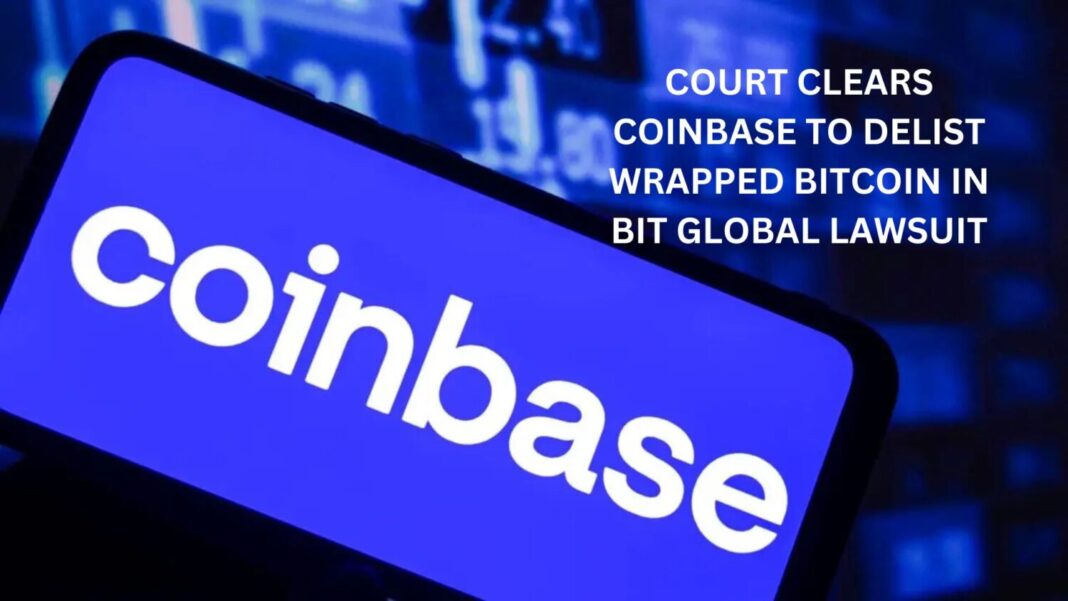Key Takeaways
- BiT Global accused Coinbase of unfair business practices, alleging that the exchange’s decision was intended to promote its own wrapped Bitcoin product, cbBTC
- Coinbase defended its decision to delist wBTC was motivated by concerns over the potential for the token’s control to fall into the hands of Justin Sun.
A U.S. District Court has ruled in favor of Coinbase, allowing the company to proceed with its plan to delist Wrapped Bitcoin (wBTC) despite a legal challenge from BiT Global, a Hong Kong-based firm with ties to Justin Sun, co-founder of the Tron blockchain.
On December 19, U.S. District Judge Araceli Martínez-Olguín denied BiT Global’s request for a temporary restraining order that sought to prevent Coinbase from removing wBTC, finding that the firm had not demonstrated irreparable harm that would justify halting the delisting.
The legal battle centers around Coinbase’s decision to remove wBTC, a tokenized version of BTC, from its exchange. BiT Global, a custodian of the wrapped Bitcoin reserves alongside BitGo, claims that the removal would harm its business and the broader market for wrapped BTC, which currently has a market cap of around $14 billion.
In its lawsuit, BiT Global accused Coinbase of unfair business practices, alleging that the exchange’s decision was intended to promote its own wrapped Bitcoin product, cbBTC, which launched in September 2023.
BiT Global’s lawsuit also contends that Coinbase’s delisting of wBTC amounts to a violation of federal and state laws promoting fair competition. The firm argued that removing wBTC from Coinbase’s platform would severely impact the liquidity and trading volume of the token, pointing to a 5% drop in the supply of wBTC immediately after the announcement.
The company further alleged that Coinbase’s actions damaged BiT Global’s reputation and threatened the viability of wBTC in the market.
Coinbase defended its decision to delist wBTC was motivated by concerns over the potential for the token’s control to fall into the hands of Justin Sun. Sun, who has faced allegations of market manipulation and fraud, was accused of attempting to exert influence over wBTC’s management through his connection to BiT Global.
Coinbase has repeatedly raised concerns about Sun’s involvement in the wrapped Bitcoin product, particularly after he criticized Coinbase’s launch of cbBTC and suggested that it would centralize control over Bitcoin in a way that would harm the broader cryptocurrency ecosystem.
In court, Coinbase’s legal team argued that wBTC’s trading volume on their platform constituted less than 1% of the total trading volume for the token and that the supply of wBTC had already been decreasing before the delisting announcement.
They further stated that the decision to delist the asset was a necessary step to protect the integrity of the exchange. Coinbase’s attorney emphasized that the company’s actions were not motivated by anti-competitive intent but rather by its responsibility to manage risk and ensure the security of its platform.
BiT Global, which partnered with BitGo in August 2023 to diversify the custody of wBTC, is seeking a judgment to prevent Coinbase from delisting the asset. While BitGo is a U.S.-based firm, BiT Global has set up operations in Hong Kong and Singapore. The two companies, along with BitGo Singapore, share responsibility for holding private keys for the minting and destruction of wBTC.
In addition to the legal dispute over wBTC, the case also highlights broader concerns about competition in the wrapped Bitcoin market. Since Coinbase introduced cbBTC in September 2023, the product’s circulating supply has reached over 20,700 tokens, with a market cap of over $2.1 billion.
While both wBTC and cbBTC are backed 1:1 by Bitcoin, the competition between the two products raises questions about how exchanges manage the listing of assets and the potential impact on liquidity and market dynamics.
The lawsuit also touches on the ongoing scrutiny of Justin Sun, who has faced regulatory challenges in the U.S. and elsewhere. In the past, Sun has been accused of fraud and market manipulation by the U.S. Securities and Exchange Commission (SEC), allegations which he denies.




